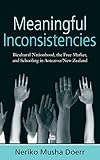Meaningful Inconsistencies : Bicultural Nationhood, the Free Market, and Schooling in Aotearoa/New Zealand / Neriko Musha Doerr.
Material type: TextPublisher: New York ; Oxford : Berghahn Books, [2009]Copyright date: ©2009Description: 1 online resource (242 p.)Content type:
TextPublisher: New York ; Oxford : Berghahn Books, [2009]Copyright date: ©2009Description: 1 online resource (242 p.)Content type: - 9781845456092
- 9781845459338
- Education, Bilingual -- New Zealand -- Whangarei District
- Education, Bilingual -- New Zealand
- Education, Secondary -- New Zealand -- Whangarei District
- Education, Secondary -- New Zealand
- Educational anthropology -- New Zealand
- High school students -- New Zealand -- Whangarei District
- Māori (New Zealand people) -- Education (Secondary)
- Multicultural education -- New Zealand -- Whangarei District
- Multicultural education -- New Zealand
- Māori (New Zealand people) -- Education (Secondary)
- EDUCATION / Philosophy, Theory & Social Aspects
- Educational Studies, Anthropology (General)
- 373.93/16 22
- online - DeGruyter
| Item type | Current library | Call number | URL | Status | Notes | Barcode | |
|---|---|---|---|---|---|---|---|
 eBook
eBook
|
Biblioteca "Angelicum" Pont. Univ. S.Tommaso d'Aquino Nuvola online | online - DeGruyter (Browse shelf(Opens below)) | Online access | Not for loan (Accesso limitato) | Accesso per gli utenti autorizzati / Access for authorized users | (dgr)9781845459338 |
Browsing Biblioteca "Angelicum" Pont. Univ. S.Tommaso d'Aquino shelves, Shelving location: Nuvola online Close shelf browser (Hides shelf browser)
Frontmatter -- CONTENTS -- TABLES -- ACKNOWLEDGMENTS -- ABBREVIATIONS -- INTRODUCTION -- 1 SHIFTING TERRAINS Aotearoa/New Zealand’s Changing Nationhood -- 2 CATEGORIZING Changing Official Regimes of Difference in Aotearoa/New Zealand Statistical Publications -- 3 INHABITING WAIKARAKA HIGH SCHOOL Daily Life at Waikaraka High School and Fieldwork Experiences -- 4 SORTING The Tracking System and Production of Meanings -- 5 CALLING IT SEPARATIST On Conflating Two Regimes of Difference -- 6 IMAGINING “FAILURE” The Illusion of Māori Underachievement and Institutional, Ethnic, and Academic Regimes of Difference -- 7 LAUGHING Language Politics in the Classroom -- 8 LAUGHING GLOBALLY Creation of Alliances and Globally Homologous Regimes of Difference -- 9 DANCING Cultural Performance and Nationhood -- 10 CONCLUSION AND DEPARTURE -- GLOSSARY -- REFERENCES -- INDEX
restricted access online access with authorization star
http://purl.org/coar/access_right/c_16ec
School differentiates students-and provides differential access to various human and material resources-along a range of axes: from elected subjects and academic "achievement" to ethnicity, age, gender, or the language they speak. These categorizations, affected throughout the world by neoliberal reforms that prioritize market forces in transforming educational institutions, are especially stark in societies that recognize their bi- or multicultural makeup through bilingual education. A small town in Aotearoa/New Zealand, with its contemporary shift toward official biculturalism and extensive free-marketization of schooling, is a prime example. Set in the microcosm of a secondary school with a bilingual program, this important volume closely examines not only the implications of categorizing individuals in ethnic terms in their everyday life but also the shapes and meaning of education within the discourse of academic achievement. It is an essential resource for those interested in bilingual education and its effects on the formations of subjectivities, ethnic relations, and nationhood.
Mode of access: Internet via World Wide Web.
In English.
Description based on online resource; title from PDF title page (publisher's Web site, viewed 25. Jun 2024)









